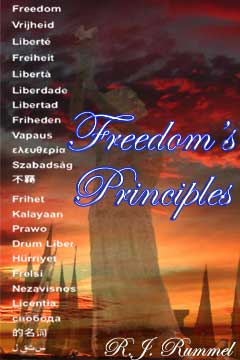[First published April 16, 2005] This is a blog for communication and activism among those who want to foster freedom at home and abroad. Whether Democrats, Republicans, or Libertarians, or liberals or conservatives, if you believe in individual freedom foremost as a right of all people, and as an obligation of those who are free to help unchain those now suffering repression and enslavement in one country after another, this blog is for you.
Why invent the new terms, freedomists or freedomism, rather than apply one of the conventional political party labels? (-ist is a suffix meaning a follower or believer in certain beliefs, such as is a socialist or feminist.) Because their general politics to not entail freedom as a core theme, although some of their political leaders may so emphasize. Republicans, if I may take President Bush as most representative, are Freedomists in their foreign policy, to a much lesser extent in their economic policies, and not at all in their traditional social conservatism.
Democrats, judging by Secretary Hillary Clinton, who is not among the far left of her party, and former President Bill Clinton who is a more moderate Democrat than she is, the Democrats do want to spread democratic freedom. But precedence is given to the UN, to normalcy, and to stability in international relations. National defense is important, but second to international aid, sensitivity to the “international community, and “building bridges.” Moreover, Democrats are soft socialists at home, believing in tight government economic regulation and controls, spreading the wealth, and cradle to grave welfare. However, on social matters, they do emphasize freedom not only rhetorically, but in their policies.
Surely, however, there are the libertarians who seems much closer to what I mean by freedomists. When I wore my heart on my sleeve as a youth, I was a democratic socialist, but in the early 1970s, under the hammer blows of von Mises, Hayek, and Milton Friedman, I gave up a belief in socialism for democratic libertarianism. And libertarian is what I called myself until recently. I remain libertarian in domestic policy, which is to say the more domestic freedom from regulation, government control, taxation, and oppressive laws, the better up to a point. I am not an anarchist, but believe social justice means minimal government consistent with protecting and guaranteeing all have equal civil and political rights.
However, on foreign policy the libertarian, with some exceptions, is an isolationist, fundamentally opposed to foreign involvements and interventions, and on this some libertarians have formed an odd coalition with the democratic socialist to communist (Marxist) left. Most libertarians, however, say, “Let international relations also be free. Let there be free trade and commerce, and freedom for other countries to do whatever they want with their people. Not our business.”
On this, the libertarians are blinded by their desire for freedom, not realizing that everything, including freedom demands contextual qualification (should those with a dangerous infectious disease remain free, when they could spread it far and wide, killing maybe hundreds with it?). By their isolationism, libertarians are making the world safe for the gangs of thugs (called dictatorships) that murder, torture, and oppress their people, and rule by fear.
Not our business, the libertarian still will say, although his fundamental belief in freedom is being violated in the most horrible ways. By implication, in his isolationism the libertarian is declaring that since it’s some body else that’s suffering, not me, my loved ones, or my friends, it’s okay.
But besides this basic human me and mine, it is also a blindness to his own welfare and that of his loved ones. For in an age of readily transportable biological weapons, such as anthrax, and nuclear weapons, no longer can a country like the U.S. sit back and ignore what goes on elsewhere in the production and deliverability of such weapons. In the hands of those who hate the democracies and their libertarian values, democracies have too much vulnerability to attack. Now, explicit and concrete opposition to, and intervention in, the rapacious affairs of thug regimes is of necessity a protection of democracies, not to mention advancing human rights and the freedom libertarians praise. Quite simply, no thug regimes can be trusted with either the possession or the capability of producing such weapons.
The isolationist, of whatever political party, is willing to let the thugs rule not only their own sorry people, but the world.
So, I am a freedomists, and I believe many others are as well.



 Posted by rudyrummel
Posted by rudyrummel 






